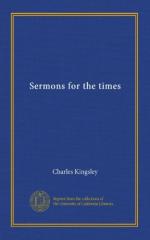My friends, what this text really means is one thing; what we may choose to think it means is another thing—perhaps a very different thing. I will try and show you what I believe it really means.
‘Whosoever believeth on Him shall not be ashamed.’ It seems as if St. Paul thought, that not being ashamed had to do with salvation, and being saved; ay, that they were almost the same thing: for he says just before, if thou doest so and so, thou shalt be saved; for with the heart man believeth unto righteousness, and with the mouth confession is made unto salvation; for the Scripture saith, ‘Whosoever believeth on Him shall not be ashamed;’ as if being ashamed was the very thing from which we were to be saved. And certainly that wise and great man, whoever he was (some say he was St. Ambrose, Bishop of Milan, in Italy), who wrote the Te Deum, thought the same; for how does he end the Te Deum? ’O Lord, in Thee have I trusted: let me never be confounded,’ that is, brought to shame. You see, after he has spoken of God, and the everlasting glory of God, of Cherubim and Seraphim, that is, all the powers of the earth and the powers of the heavens, of Apostles, Prophets, Martyrs, the Holy Church, all praising God, and crying ’Holy, holy, holy. Lord God of Hosts, Heaven and Earth are full of the majesty of Thy glory;’ after he has spoken of the mystery of the Trinity, Father and Son and Holy Ghost, of Christ’s redemption and incarnation, and ascension and glory; of His judging the world; of His government, and His lifting up His people for ever; after he has prayed God to keep them this day without sin, and to let His mercy lighten upon them; after all this, at the end of this glorious hymn, all that he has to say is, ’O Lord, in Thee have I trusted: let me never be confounded.’—All he has to say: but that is a great deal: he does not say that merely because he wants to say something more, and has nothing else to say. Not so. In all great hymns and writings like this, the end is almost sure to be the strongest part of all, to have the very pith and marrow of the whole matter in it, as I believe this end of the Te Deum has; and I believe that whoever wrote it thought that being confounded, and brought to shame, was just the most horrible and wretched thing which could happen to him, or any man, and the thing above all others from which he was most bound to pray God to save him and every human being.
Now, how is this? First, let us look at what coming to shame is; and next, how believing in Christ will save us from it.
Now, every man and woman of us here, who has one spark of good feeling in them, will surely agree, that coming to shame is dreadful; and that there is no pain or torment on earth like the pain of being ashamed of oneself: nothing so painful. And I will prove it to you. You call a man a brave man, if he is afraid of nothing: but there is one thing the very bravest man is afraid of, and that




